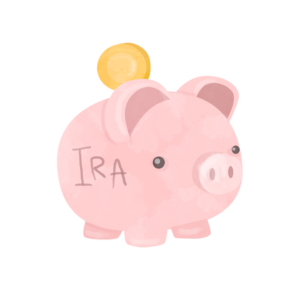
According to the IRS, the average tax refund in 2022 was $3,121. (If you’re like me and didn’t get nearly that much money back, or maybe even owed money, you can check out our blog on how to avoid tax return FOMO next year.)
Now, the temptation to take your $3k and go on a shopping spree might be nearly unbearable, but before you do, take a deep breath. There’s a lot you could do with that money to secure your financial situation down the road.
We’ve compiled a list of seven more money savvy things you could do with your tax refund than making it rain at Nordstrom, and you should probably read it before going nuts at the mall. Believe me, your future self will thank you for taking our advice.
(Don’t worry, we also included some fun, somewhat irresponsible stuff you could spend your money on at the end.)
High interest debt, like credit card debt, is one of the most expensive recurring costs Americans face. With monthly interest rates that approach (or even exceed) 20%, the absolute last thing you want to be doing is leaving a balance on your credit card for months on end.
Despite this, the average American had over $5,000 in active credit card balances in 2021. If your interest rate were 18% (which is lower than most folks could hope for unless you have an outstanding credit score), you’d end up paying $900 per year on that debt’s interest alone.
So, while paying off your credit card debt might not seem like the most fun thing to do with a tax refund, the feeling of weightlessness that comes from freeing yourself from such a heavy financial burden is well worth it. (Trust me; I know from personal experience.)
Plus, eliminating debt means you’ll have one less bill to pay each month, which frees you up to save (or enjoy life) more.
Even if your tax refund won’t cover the entirety of your outstanding high interest debt, it’s likely to make a sizeable dent, and that progress could save you hundreds if not thousands of dollars in the long run

If you already have an IRA you’re doing better than lots of folks and you should pat yourself on the back. However, if you aren’t maximizing your yearly deposits, you’re leaving a lot on the table in terms of post-retirement comfort.
The IRS allows individuals to contribute up to $6,500 per year to an IRA (or $7,000 if you’re 70 or older). So, if you haven’t contributed that much to your IRA this year, using your tax refund to meet that maximum would be an excellent idea.
Here’s an example of what maxing out your retirement contributions each year could mean for you in the long run (courtesy of an easily-Googleable IRA calculator):
Steve started making Roth IRA contributions at the age of 30, and plans to retire at 65. However, Steve is only contributing $5,000 to his IRA each year. When Steve retires at 65, he will have contributed $175,000 to his retirement fund, which will be worth about $418,000.
Amy started making IRA contributions at 30 and plans to retire at 65 as well, however she contributes the maximum of $6,500 annually. When Amy retires, she will have contributed $227,500 to her IRA, which will be worth about $543,200.
So, while Amy only deposited $52,500 more than Steve, her IRA is worth $125,200 more than his.
The moral of this story is the more money you invest in an IRA now, the more you’ll have when you retire.
Nobody really wants to think about what would happen if, say, a tree fell on your house and destroyed a precious heirloom that just happened to not be insured. Or, far worse (and, unfortunately, far more likely) what you would do if you were in an accident that prevented you from working.
Whether we want to think about them or not, life is full of surprise misfortunes of all shapes and sizes. Only the most reckless and irresponsible forge ahead without a contingency plan. So, if you don’t have an emergency fund set up, your tax refund is a great place to start.
The bummer here is that your tax refund is unlikely to be enough money to establish an emergency fund that can pay the bills for an extended period of time, so you’ll need to also make plans to continue contributing. However, it would be a nice leg-up if you don’t have anything squirreled away for a rainy day.
If you have (or plan to have) kids, you probably wanted to set up a savings account for their college expenses a loooong time ago given how expensive college is getting.
According to the Education Data Initiative (a research-based nonprofit whose sole purpose is to collect data on education in the US), the average cost of attendance (including tuition, room and board, books, and other fees) at a four-year college or university was $35,551 in 2023.
If your kid has grandiose aspirations for their higher education, however, you could be on the hook for quite a lot more than that. A Harvard education, for example, is going to run you just under $80,000 per year as of 2023.
Given all this, the average tax refund isn’t going to make much of a dent on a tuition payment, but starting with a couple thousand dollars in an account feels a whole lot better than starting with nothing.

The interest rates on mortgages are like fluffy bunnies compared to the rabid wolverines that are credit card rates, however paying down your mortgage early is likely still a better idea than letting money sit around in savings accounts.
This is especially true if you don’t have 20% equity in your home and so are still paying PMI every month, which likely costs you a couple hundred dollars and doesn’t pay down interest or principal on your loan.
In all honesty, however, you might be able to put your tax refund to better use. Interest rates on home loans tend to be quite a lot lower than, for example, the 10% average growth you can expect when investing in the stock market.
Investing involves risk, of course, whereas paying off your mortgage doesn’t, so if you want to guarantee equity, that might be the way to go.

Investing your tax refund in home improvements is a great way to not only build wealth long-term, but enjoy some comforts in the present.
Putting money into to your home not only increases the value of your property if you wanted to sell it later on, but “capital improvements” (loosely defined as a repair or improvement that makes your property more valuable long-term) are also tax-deductible, which means you can pass savings on to your future self when you go to file your taxes next year.
Here are just a few home improvements you could feasibly make for around $3,000 that are likely to add significant value to your property overall:
The IRS is fairly finicky when it comes to awarding capital improvement tax credits (and there are specific forms that need to be filed if you want to claim them), but all of these improvements will add value to your home in the long run.

Whether you’re thinking about a shift in career or you simply want to learn a new skill or dig deeper into content you already know, investing in yourself by continuing your education might just be as good of a way to spend your tax refund as starting an IRA.
The average cost to take a single class at a private, four-year university is somewhere in the ballpark of $2,000 – $4,000, which means you could probably cover it using your tax refund (though you might need a little extra cash).
What’s more, if your interest in continuing education is more recreational, most cities (and even some smaller towns) have community centers where you can take classes in everything from drawing to quilting to blacksmithing — and these are going to be much cheaper than attending actual courses at an accredited university.
If you are interested in earning, say, a Master’s degree, however, you could significantly reduce the cost to yourself by applying your tax refund to tuition costs.
Okay, we made it to the fun part! If you don’t want to do something responsible with your tax refund like starting a high yield savings account for your kid’s college or securing your financial future by investing in an IRA, there are plenty of ways you can spend your tax refund that will bring you immediate enjoyment.
Here’s a short list of “irresponsible” purchases you can make for around $3,000 (which, to be honest, aren’t even all that irresponsible):
If there’s a place you’d like to be other than where you are, you could probably visit using the money from your tax refund. You can fly basically anywhere in the world economy class for less than than you’ll get back with the average tax refund.
For example, a Delta flight from Rochester, NY to Tokyo, Japan with no notice whatsoever came in at under $2,000.
You spend more time in your bed than basically anywhere else (and if you don’t, you should see a sleep specialist). So, splurging on the most comfortable bed money can buy is an extremely worthwhile thing to do with your tax return windfall.
A California-king-sized luxury mattress will run you about $2,000, which means you could still have plenty of money left over to buy sheets and pillows that will make your friends positively drool with jealousy.
For plenty of Americans, the logic that allows for bed-splurging also applies to the purchase of a nice, comfortable couch.
While you could shell out close to $10,000 on a designer couch, it’s unlikely that your tax return is going to get you that kind of money. Luckily, you can get a quality, comfortable couch for under $3,000.
(Personally, I’d recommend the Harmony from West Elm.)
If you’re a musician, there is little more exciting you could do for yourself than buying an excellent instrument. While you certainly won’t be able to buy Paul McCartney’s Höfner bass with tax return money, most high-end instruments (that weren’t owned by rock stars) should be within your reach.
Even if you aren’t a musician, collecting musical instruments could be a fun hobby, and antique and vintage instruments do tend to appreciate over time.
While you won’t be getting any original Monets with your tax refund, you could certainly decorate your home in a way that makes it look like you have a lot more expendable income than you actually do by buying original art.
What’s more, if you buy from local artists, you get the added benefit of supporting the artistic community where you live, which will make your community a brighter and more vibrant place overall.
And you never know: you might just buy a piece that appreciates.
This is the kind of question that has a lot of answers, all of which will change depending on your personal goals and needs. While spending money on groceries isn’t necessarily how an advisor would recommend you use your tax refund, it might just be the best thing for you to do.
The same could be said for a vacation: while it won’t support your retirement the same way a savings account would, spending money on a vacation that improves your mental health might just be worth more than any traditional or roth IRA ever will.
From a strictly financial perspective, you shouldn’t spend your tax refund on ephemeral purchases — ones that don’t last and won’t add value or wealth long-term. Things like food or “experiences” would fall into this category.
But, like we said: it’s more complicated than that, and you should spend your tax refund in the way that you think will improve your life the most, whether on immediate needs or long-term savings.
We actually wrote a blog on this topic (which you should check out here), but here’s a super abridged version of our advice:
Whether you file as single, head of household, married jointly, or married separately will determine how much money you get at tax time. Make sure you look into which statuses you qualify for, and choose the one that will get you the highest standard deduction.
It’s hard to get enough deductions to outweigh the standard deduction, unless you have a more complicated tax situation (like you own your own business or just moved for work or something like that). However, a tax credit can be applied even if you take the standard deduction, and you should take advantage of every tax credit you can.
I know. Nobody wants to have to go out and do a thing, let alone pay someone to do that thing, but taxes are complicated and professionals exist for a reason. If you have anything abnormal about your particular situation, it very likely will be worth it to hire a professional to file your taxes. They’ll be able to do all the complex thinking and get you a bigger tax refund than you were expecting.
YOUR FREE FINANCIAL PLAN
Are you ready to invest in your future?
Build your free plan today.
Start now